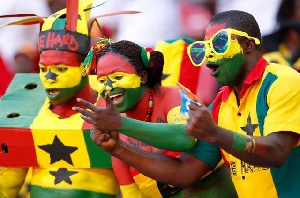Last week, we had one of the most interesting times since the inception of this column some 14 years ago when the piece on the current state of the Super Morning Show on Joy FM was put on the surgical table for dissection.
The response to that article was beyond what I could imagine, both in agreement and disagreement (but mostly in agreement), of my prognosis.
That is done and so we move on to other things, until such time in the future as there will be the need to revisit the issue. So let’s talk about the World Cup, shall we?
I know it is well over three months before the Brazilian skies are lit with seven billion stars, but there is still something to talk about, indeed many things to talk about, broadcast rights (television, radio, public showing, etc.) are concerned.
Where are you going to watch the matches when the FIFA World Cup or Brazil 2014 kicks in from June 12 this year? Will you be in Brazil? Will you watch from home? Will you be at the favourite bar/pub to watch? Will you be at a viewing centre or a fan park to watch?
All the above are options that football lovers, and their not-so-football-loving partners, will get themselves involved with in order to see the matches during the upcoming world cup, apart from such other means as online streaming and radio broadcast.
Let’s face it, not many people will travel to Brazil to watch the matches at the World Cup. The fraction of the Ghanaian population that would end up in the South American country will be very infinitesimal and so it is important that the bigger fraction that would remain back home should be properly served through the various means referred to above to enjoy the tournament.
Exactly a month ago, there was a big gathering at the La Palm Royal Beach Hotel where the people who know what it is or rather the people who have the rights to broadcast the World Cup matches in Ghana told the media and the advertising community about what and how this would be done.
To start with we were told that the World Cup would be shown on six free-to-air television channels only. GTV is the lead station in what has become known as the Ghana Television Consortium along with Metro TV, GTV Sports Plus, Net 2 TV, ETV and First Digital TV (former Skyy Digital TV).
It was surprising to many that some of the bigger guns in local television broadcasting were not mentioned as part of the consortium and therefore not going to show the matches during the world cup.
TV3, the most watched television station in Ghana, wasn’t in there, Viasat1 TV one of the stations among what I call the “Sky Four” (TV3, GTV, Metro TV, Viasat1) wasn’t there, TV Africa was lost there as well, the fastest rising TV station, UTV, was missing and so was the Multimedia Group’s shop Multi TV.
I will tell you the reason why some of these stations were not mentioned as part of the stations to broadcast the matches but first let me tell you about how the minister of sports eulogised the stations that came together to form the consortium.
“This is the power of collaboration and I hope it sends a strong signal to the rest of Africa and the World,” Sports Minister Elvis Afriyie Ankrah said at the launch in early February, “that you can achieve more with collective efforts rather than individual efforts.
“And I am in no doubt that this consortium will deliver the best broadcast services for Ghanaians to really enjoy these tournaments.” Thus, as far as the sports minister was concerned, the Ghanaian football fan is covered with this band of stations showing the matches.
Before I go on to any other thing let me say, before I forget, that it really doesn’t matter the number of stations that show the match so long as they can reach viewers from many parts of the country we shall all chase to find them to watch.
Remember in 2006 the only station that had the rights and showed the matches was Metro TV and they did an extremely good job with the broadcast of the matches as well as the diaries that showed behind the scenes activities in the Black Stars camp among other things. We all tuned to Metro TV for the matches.
In previous years, when there were not many stations and television rights were not as expensive as they are now, we had only GTV to turn to for World Cup matches.
I watched my heroes Socrates and Diego Amando Maradona in the 1986 world cup and watched Roger Milla and his motley of not bright stars from Cameroon beat a team comprising superstars like Maradona, Claudio Caniggia, Jorge Burruchaga and Sergio Goycochea (or was it Pumpido?) with master tactician Carlos Bilardo as their manager in the 1990 World Cup all on GTV.
The point here is that it is not in the numbers that we get to see the best of matches because even if we don’t have all stations showing we shall all make that singular effort to chase after the one station that shows so we can watch the matches whether they involve the Black Stars or not.
That said though it is also important to add that where there is the opportunity to collaborate we need to ensure that we take advantage of it to get a bigger voice for the industry and that is where I would agree with the minister on the need to commend the consortium on their collaborative effort.
Sports Features of Friday, 7 March 2014
Source: Francis Doku

















